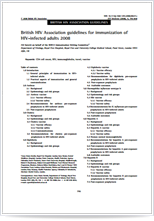 Introduction
Introduction
Compared with HIV-seronegative individuals, HIV-seropositive persons may have an increased risk of infection or experience more severe disease following exposure to vaccine-preventable diseases. The positive impact of antiretroviral therapy on the natural history of HIV infection makes the formulation of HIV-specific immunisation guidelines important at this time.
The guidelines contain evidence-graded recommendations that can assist the judicious use of active and passive immunisation in HIV-infected adults as a cost-effective way of reducing the disease burden for individual patients while also providing a wider public health benefit. The primary objective is to inform clinical practice based on the best available evidence and expert consensus opinion at the time of development. Given the paucity of controlled studies, the recommendations are often an expression of a consensus derived from descriptive studies, clinical experience and expert opinion.
Downloads
British HIV Association guidelines for immunization of HIV-infected adults 2008
Writing Group
- Dr Anna Maria Geretti (Chair), Royal Free Hospital, London
- Dr Gary Brook, Central Middlesex Hospital, London
- Ms Claire Cameron, Health Protection Agency, Colindale
- Dr David Chadwick, James Cook University Hospital, Middlesbrough
- Dr Robert S Heyderman, University of Bristol, Bristol
- Dr Eithne MacMahon, Guy’s and St Thomas’ NHS Foundation Trust, London
- Dr Anton Pozniak, Chelsea and Westminster Hospital, London
- Dr Mary Ramsay, Health Protection Agency, Colindale
- Dr M Schuhwerk, Mortimer Market Centre, London
Reference
HIV Med, 2008, 9, 795-848



